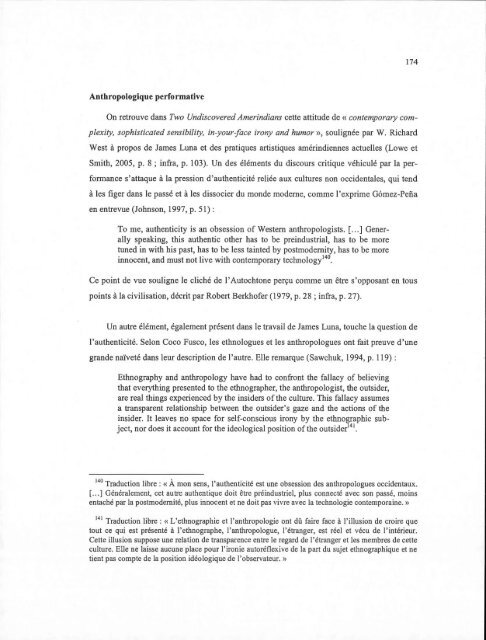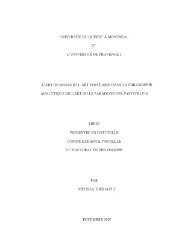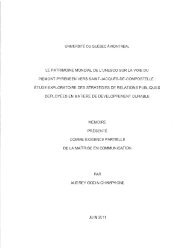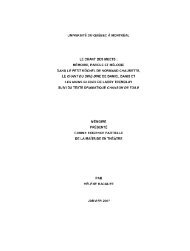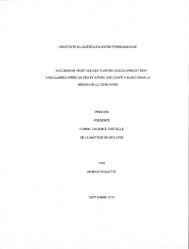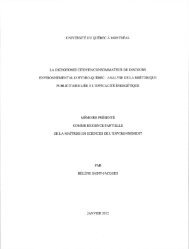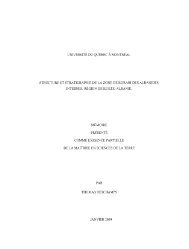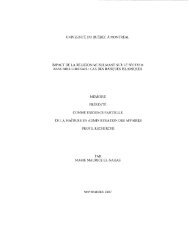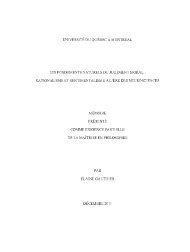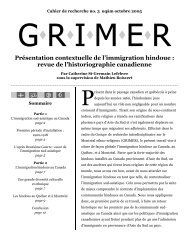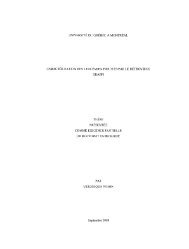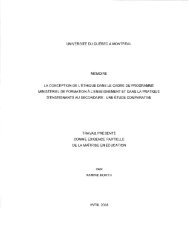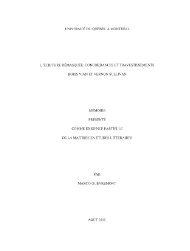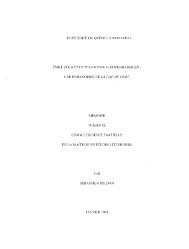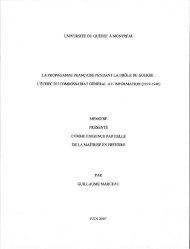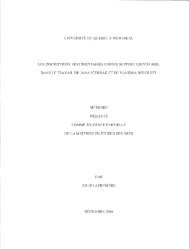- Page 1 and 2:
UNIVERSITÉ DU QUÉBEC À MONTRÉAL
- Page 3 and 4:
REMERCIEMENTS Je remercie profondé
- Page 5 and 6:
CHAPITRE 2 L ES DÉTOURNEMENTS CRIT
- Page 7 and 8:
Hock E Aye Vi Edgar Heap of Birds .
- Page 9 and 10:
RÉSUMÉ Cette thèse aborde des pr
- Page 11 and 12:
éflexion vise à démontrer de que
- Page 13 and 14:
(2004-2008). Ce projet participatif
- Page 15 and 16:
ses règles, adoptant une posture i
- Page 17 and 18:
eyond the simple declaration that i
- Page 19 and 20:
image fixe telle qu'une photographi
- Page 21 and 22:
gravité, la parodie et la charge p
- Page 23 and 24:
attitude caractérisée un désir d
- Page 25 and 26:
(«Columbus Day», 1983) et d'une s
- Page 27 and 28:
concernant les cultures amérindien
- Page 29 and 30:
met en vedette des personnages d'In
- Page 31 and 32:
cette origine. Comme l'écrit Mathi
- Page 33 and 34:
Il oscille entre deux types de pers
- Page 35 and 36:
Puis vint l'Indien Bien qu'il parvi
- Page 37 and 38:
L'image de l'Indien est toujours un
- Page 39 and 40:
Une image contradictoire Le paradox
- Page 41 and 42:
que ces images ne représentent pas
- Page 43 and 44:
L'image de l'Indien est une représ
- Page 45 and 46:
Il serait ainsi nécessaire de reco
- Page 47 and 48:
L'origine du terme « stéréotype
- Page 49 and 50:
cliché aurait une raison de se fai
- Page 51 and 52:
«La représentation et l'identité
- Page 53 and 54:
Postmodernism and Cultural Politics
- Page 55 and 56:
La représentation en art et en lit
- Page 57 and 58:
Olive Patricia Dickason écrit à c
- Page 59 and 60:
that of others that tru/y honors th
- Page 61 and 62:
autre illusion, puis une autre, le
- Page 63 and 64:
tricks ter toutefois, il ne s'agit
- Page 65:
depictions of the tricks ter are po
- Page 68:
évacue l'aspect « glissant » de
- Page 71 and 72:
Pour Peggy Phelan, l'intention du p
- Page 73 and 74:
s'adresse. Les pratiques performati
- Page 75 and 76:
Tite Artifact Piece La performance
- Page 77 and 78:
Le contenu du premier présentoir r
- Page 79 and 80:
C'est vivant ! D'une certaine mani
- Page 81 and 82:
-----------------------------------
- Page 83 and 84:
materials, thereby influencing visi
- Page 85 and 86:
know relationship by separating the
- Page 87 and 88:
individu, nommé James Luna, améri
- Page 89 and 90:
cultural/y hungry want», comme l'
- Page 91 and 92:
La performance est un miroir critiq
- Page 93 and 94:
En se muséifiant en tant que sujet
- Page 95 and 96:
elativement dissidentes (Ginsberg e
- Page 97 and 98:
questionnement sur la représentati
- Page 99 and 100:
Les performances de Lord et de Luna
- Page 101 and 102:
À travers des jeux simples d'oppos
- Page 103 and 104:
l'Université Essex à Londres en 2
- Page 105 and 106:
dans l'espoir de recevoir de l'arge
- Page 107 and 108:
tôt et toujours de ses lunettes fu
- Page 109 and 110:
une représentation du corps sans c
- Page 111 and 112:
travail de James Luna, toute certit
- Page 113 and 114:
public présent. Et il répète l'a
- Page 115 and 116:
un troisième. Ces trois différent
- Page 117 and 118:
comme on le ferait avec une vedette
- Page 120 and 121:
trickster qui, feignant une gaffe,
- Page 122 and 123:
James Luna perfonne le sujet améri
- Page 125 and 126:
La performance The Guatinaui World
- Page 127 and 128:
Bien qu'elle s'accompagne d'un impo
- Page 129 and 130:
petit appartement, on trouve, au ce
- Page 131 and 132: anachronique, digne d'un magasin de
- Page 133 and 134: Comme nous l'avons vu au sujet de l
- Page 135 and 136: ln a cage, in a museum, in a societ
- Page 137 and 138: for eight hours a day, they listene
- Page 139 and 140: sin, l'artiste, accompagné de sa c
- Page 141 and 142: Pour les performeurs, l'année 1992
- Page 143 and 144: (2009, p. 54) : « En tant que proj
- Page 145 and 146: l'histoire de l'exposition de peupl
- Page 147 and 148: d'ailleurs constituer une autre fa
- Page 149: «l'impresario» de ces expositions
- Page 152 and 153: l'expérience. «La performance se
- Page 154 and 155: Le lieu de la performance Si l'art
- Page 156 and 157: La crédulité du public s'est dava
- Page 158 and 159: - - - ---- - -------- - - --------,
- Page 160 and 161: Comme le dit l'adage, les sceptique
- Page 162 and 163: Les deux textes reproduits sur des
- Page 164 and 165: Coke, and his favorite cigarette br
- Page 166 and 167: éflexion sur ces conventions. Cela
- Page 168 and 169: Ce résumé illustre l'étendue des
- Page 170: the performance attested to how dee
- Page 173 and 174: La performance est construite pour
- Page 175 and 176: comme on se costumerait en infirmi
- Page 177 and 178: Coco Fusco commente ainsi la répon
- Page 179 and 180: ----- - - ------------------- -----
- Page 181: · Puisqu'il n'en va pas de même p
- Page 185 and 186: conceived it, contra/led il, and ob
- Page 187 and 188: ethnographique colonisé serait inc
- Page 189 and 190: non-occidentales se retrouve dans t
- Page 191 and 192: Le récit de Lori Blondeau illustre
- Page 193 and 194: Blondeau et de Stimson ne cessent d
- Page 195 and 196: priation. Il prend aussi différent
- Page 198 and 199: -------------- Dans cette œuvre, l
- Page 200 and 201: ---- ---------- -------------------
- Page 202 and 203: L'artiste ridiculise et amérindian
- Page 204 and 205: confident, enticing the viewer ta l
- Page 206 and 207: ligne), l'artiste explique ainsi l'
- Page 208 and 209: stratégie de subversion s'articule
- Page 210: photographie est presque exclusivem
- Page 213 and 214: public. Il s'installe ainsi entre l
- Page 215 and 216: permet d'actualiser dans une ambian
- Page 217 and 218: liberté, ce qu'il y a d'irresponsa
- Page 219 and 220: these artists depict the West as hi
- Page 221 and 222: -----------------------------------
- Page 223 and 224: naire, ces représentations sont es
- Page 225 and 226: drapeau de la Grande-Bretagne. Sans
- Page 227 and 228: Le rôle de la photographie Sur une
- Page 229 and 230: - -------- -------------- ---------
- Page 231 and 232: La performance de Blondeau et Stims
- Page 233 and 234:
-------- -- -------- - -------- laq
- Page 235 and 236:
CHAPITRE 5 DÉTOURNEMENT, AUTHENTIC
- Page 237 and 238:
d'une cour arrière, vêtu d'un cos
- Page 239 and 240:
l'homme Indien -, sa presque nudit
- Page 241 and 242:
--- - -·------- - ----------------
- Page 243 and 244:
l think that, in a weird sense, l w
- Page 245 and 246:
Dans le travail de Houle, les repr
- Page 247 and 248:
vedette Winnetou), mais fait aussi
- Page 249 and 250:
- · - --··- ·- ·--------- sté
- Page 251 and 252:
Dans le récit somme toute complexe
- Page 253 and 254:
Nations. L'agentivité extravagante
- Page 255 and 256:
de vie (salon, bureau, chmnbre à c
- Page 257 and 258:
« cyborg ». Adams écrit (2007, e
- Page 259 and 260:
similaires: « INDIAN PRINCESS »,
- Page 261 and 262:
l'espace public, il donne à entend
- Page 263:
avoir utilisé leur logo sans permi
- Page 266 and 267:
gender difference that is not also
- Page 268 and 269:
-- ---- ------- makes y ou wonder,
- Page 270 and 271:
donne une voix résolument urbaine
- Page 272 and 273:
Fuck your colonial euro-attitude du
- Page 274 and 275:
jeux de mots et calembours chez Fra
- Page 276 and 277:
Ainsi, utiliser le verbe scalper à
- Page 278 and 279:
sacred clown of globalized capitali
- Page 280 and 281:
le rappelle Isabelle St-Amand (2009
- Page 282 and 283:
installations : troncs d'arbres, pn
- Page 284 and 285:
Les préjugés se butent à la réa
- Page 286 and 287:
les invectives de KC Adams (« I CL
- Page 288 and 289:
Ils sont partis pour la taverne. Qu
- Page 290 and 291:
-------------------- -- -- - situat
- Page 292 and 293:
Illustrant assez bien sa démarche
- Page 294 and 295:
A bloodline all the way to General
- Page 296 and 297:
L'art et l'écriture de Durham refu
- Page 298 and 299:
Plusieurs éléments mentionnés n'
- Page 300 and 301:
ement lucide, cette ironie permet
- Page 303 and 304:
Ces œuvres créent sciemment des c
- Page 305 and 306:
CONCLUSION L'ATTITUDE PERFORMATIVE
- Page 307 and 308:
Il permet également de déployer u
- Page 309 and 310:
-- -- -- - ----- ·- - ------------
- Page 311:
---------·------------- --- ------
- Page 314 and 315:
l'identité sexuelle (chez Monkman,
- Page 316 and 317:
(née en 1960 à Upsala en Ontario)
- Page 318 and 319:
Pour les artistes amérindiens d'au
- Page 320 and 321:
_____ (2006). Indians in Unexpected
- Page 322 and 323:
WEST, Richard (dir.) (2000). The Ch
- Page 324:
_ _ _ _ _ (2009). Hochelaga revisit
- Page 327 and 328:
GOMEZ-PENA, Guillermo et Roberto SI
- Page 329 and 330:
ROSENWALD, Betsy (2006). «An Inter
- Page 331:
_____ (1999). «From the Persona! t
- Page 334 and 335:
_____ (dir.) (2003). Pe1jormance: C
- Page 336 and 337:
Eco, Umberto (1979 [1965]). L 'œuv
- Page 338 and 339:
LAPLANTINE, François (1999). Je, n
- Page 340 and 341:
TAYLOR, Diana (2003). The Archive a
- Page 342 and 343:
Fig. 2: James Luna, Take a Picture
- Page 344 and 345:
335
- Page 346:
337


